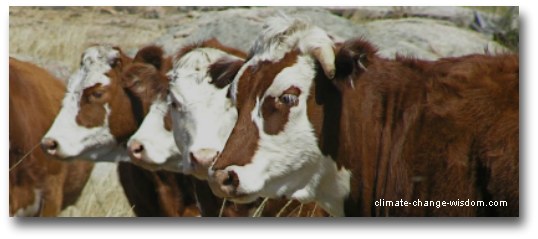Home | About CCW | Contact Us | Climate change Meaning | Causes | Solutions | Emissions | Carbon trading
Natural gas emissions
Natural gas emissions of carbon dioxide are roughly half those for coal for an equivalent amount of energy recovered.
Plus when coal burns it also releases sulfur and nitrous compounds. Natural gas gives off no sulfur and only 20% of the nitrous oxides.
The reason there are fewer emissions is that natural gas is essentially methane that burns to produce heat and carbon dioxide plus small amounts of nitrous oxides.
However, methane is also a greenhouse gas and released in its raw form is 20 times more potent than CO2 although it has a much shorter residence time in the atmosphere.
This explains why the management of fugitive emissions - methane released when coal is mined and from land fill - is part of many climate change policy options.
There are two ways that natural gas is formed.
It is a bi-product of the metabolism of archea, single celled micro-organisms that live in the wet soil of marshes and swamps, the stomachs of ruminants, and in our stomachs.

Natural gas is also formed when organic material is buried under layers of sediment to be compressed and heated. This process produces the natural gas that humans have learnt how to use as an energy source to:
- generate electricity
- heat homes and building
- power cooking stoves
- power vehicles
- and as a raw material in manufacturing
Natural gas emissions and climate change
In 2004 the IPCC Fourth Assessment Report estimated emissions from burning of natural gas at 5.3 billion tCO2e. This was roughly half the emissions from coal and half from oil.
Only demand is increasing at 2% per annum, partly because natural gas has lower emissions than the other fossil fuels. This means that by 2030 annual emissions will be 11 billion tCO2e.
When we burn natural gas, the methane turns into CO2 just as when we burn coal and oil CO2 is emitted. It is cleaner than coal or oil because there are far fewer particulates and other compounds but it still emits CO2.
So if we are really serious about emission reduction, natural gas is at best a transition fuel.
We might use it to tie us over until genuinely clean alternative fuels take over but it is still a fossil fuel and, eventually, supply will run out.
Back to top of Natural gas emissions | Return to Carbon emissions | Back to Climate-change-wisdom home page
Recent Articles
-
Reducing emissions while looking for solutions...
Nov 01, 15 04:46 PM
I've seen a lot of post's online for ideas on reducing emissions. The one suggestion I have not seen, is the most obvious. There should be a government -
Climate change evidence
Mar 24, 15 06:22 AM
Real climate change evidence has to demonstrate a change in climate. An extra sunny day or a severe storm or a flood is not enough. -
The climate change effect
Feb 19, 15 03:08 AM
What will be the climate change effect? There isn't one, there are many. Perhaps too many for us to understand.

New! Comments
Have your say about what you just read! Leave me a comment in the box below.